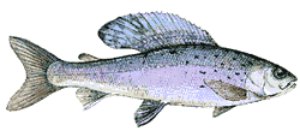The arctic grayling is native to Siberia and North America as far south as Montana. The dorsal fin is oversized, dark-gray, blotched with pale spots, with cross-rows of deep blue spots and edged with red or orange.
The dorsal fin has 17 to 25 rays. The tail fin is forked. The body has scattered black spots on silver-gray sides that sometimes have a pinkish hue. The scales on the grayling are much larger than the scales on trout. Length: 8 to 14 inches. Weight: 6 ounces to over 1 pound.
Arctic Grayling Location and Habitat
Grayling are usually found in high mountain lakes. They spend most of the year in the lake then “run” upstream to spawn in the spring.
Reproduction
Spawning by grayling is similar to that of other salmonids. It is preceded by upstream runs from lakes with males establishing territories in small streams from February to March.
Food
Their main diet is the adult and larvae of aquatic insects and other invertebrates.
Angling
Grayling are caught on both wet and dry flies. A Royal Coachman, small midge or a black or brown Woolly worm often works very well.
Table Quality
The meat is white, flaky and good tasting, although slightly oily.

